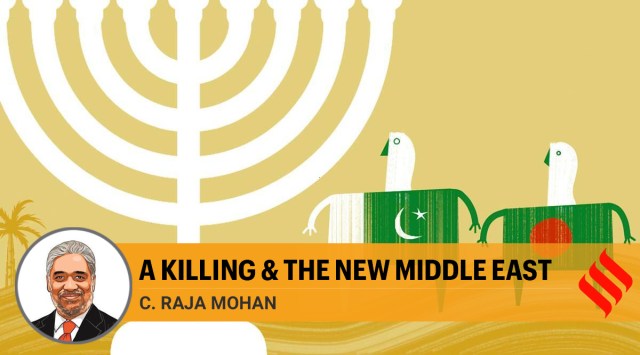- India
- International
India, Pakistan and Bangladesh must deal with changed geopolitical realities in West Asia
For now, the question is whether the South Asian states can manage the fallout from the geopolitical churn in the Middle East and seize the new opportunities that are presenting themselves.
 For Israel, having Bangladesh and Pakistan, two of the world’s largest Islamic nations, recognise it would be a great ideological and political bonus. (Illustration by C R Sasikumar)
For Israel, having Bangladesh and Pakistan, two of the world’s largest Islamic nations, recognise it would be a great ideological and political bonus. (Illustration by C R Sasikumar)The brazen murder of a top Iranian nuclear scientist outside Tehran last week underlines a familiar political truth in the Middle East — it is not that important if you are right or wrong; what really matters is whether you are weak or strong. The assassination of Mohsen Fakhrizadeh highlights the Islamic Republic of Iran’s growing strategic vulnerabilities. It also points to a continuing regional realignment against Tehran marked by the normalisation of ties between some key Arab states and Israel.
This geopolitical turbulence in the Middle East has major consequences for the subcontinent, which has intimate religious, economic, and strategic ties with the region. Whether they want to or not, India, Pakistan and Bangladesh must deal with three broad trends that define the new Middle East.
One is Iran’s growing isolation in the region. The Trump administration (and the Republicans), Israel and the Gulf Arabs have a shared interest in preventing Joe Biden, the next US President who takes charge on January 20, from renewing nuclear diplomacy with Iran and ending Tehran’s isolation. The assassination of Fakhrizadeh is about achieving that political objective. If Iran retaliates vigorously, it will invite an all-out confrontation with Israel and the US and kill the prospects for a productive engagement with the Biden administration. Holding back will expose Iran’s weakness and sharpen internal divisions between pragmatists who want to engage the US and the hardliners who are itching for a confrontation.
Worse still, the frequent attacks on high-profile Iranian targets raise questions about the hostile penetration of its society. Are there enough domestic opponents of the regime that are now willing to collaborate with foreign security agencies, including Israel’s Mossad? The exposure of Iran’s internal political weakness is compounded by the massive economic pain imposed by the Trump administration’s “maximum pressure campaign” in the last few years. Iran has much goodwill in South Asia, but India and its neighbours have no desire to get sucked into Tehran’s conflicts with the Arabs or the US.
The second regional trend is the rapid transformation of Arab relations with Israel. The fear of Iran has been driving Gulf Arabs to embrace Israel. In the last few months, Bahrain and the United Arab Emirates have normalised ties with Israel. Reports of a secret meeting between the Saudi Crown Prince Mohammed bin Salman and Israeli Prime Minister Benjamin Netanyahu late last month have been denied by Riyadh. That has not put an end to speculation of an impending normalisation of ties between Israel and Saudi Arabia — the ideological core of the Islamic and Arab world.

Where does that leave the subcontinent, which has nearly 40 per cent of the world’s Muslims?
Pakistani pragmatists long wanted to establish ties with Israel and neutralise Delhi’s connection with Tel Aviv. But the growing weight of Islamist ideology, decades of fanning theories about a Yehudi-Hindu conspiracy, and relentless propaganda equating Palestine with Kashmir seemed to hold Pakistan back.
However, the context has dramatically altered with the normalisation of ties between the Gulf Arabs and Israel. Pakistan’s Prime Minister Imran Khan has talked of pressure, apparently from Saudi Arabia and the UAE, on recognising Israel. Pakistan also knows the value of having a sensible relationship with Israel and its useful spinoffs in Washington, where Islamabad is making a desperate pitch to limit America’s current political tilt towards India. Rawalpindi is probably no longer debating the ideological arguments on Israel but the mechanics of making that decision, managing the potential domestic backlash, and getting the best possible benefits from it.
If Pakistan recognises Israel, Bangladesh would not want to be left behind. Economic and technological collaboration with Israel will give Bangladesh’s economy and foreign policy a big boost. Like Pakistan, Bangladesh, too, could use a new Jewish connection to cope with the mounting criticism in Washington of the country’s political freedoms and human rights under Prime Minister Sheikh Hasina.
For Israel, having Bangladesh and Pakistan, two of the world’s largest Islamic nations, recognise it would be a great ideological and political bonus. Some in Delhi might rue the loss of a presumed special position in Israel. But an India that proclaims the virtues of engaging all sides in the Middle East can’t grudge the same privilege for Israel in South Asia.
The third trend shaping the new Middle East is the deepening rivalry between Saudi Arabia and Turkey for the leadership of the Muslim world. While Saudi Arabia, Egypt, and the UAE want to return the Middle East towards political and religious moderation, the once secular Turkey under Recep Tayyip Erdogan has become the new champion of political Islam. Turkey’s new religious zeal provides a good ideological cover for Erdogan’s ambitions to expand its geopolitical influence in the Middle East.
Turkey’s contestation with Saudi Arabia is already having an impact on India and Pakistan. Erdogan’s Turkey is now hostile to India and has joined Pakistan in taking up the Kashmir question at international forums. For Pakistan, this seemed a useful counter to the Gulf Arabs, who were ramping up strategic ties with India and appeared unwilling to make a big deal of Delhi’s constitutional changes in Kashmir.
Earlier this year, a peeved Pakistan challenged Saudi Arabia by threatening to break the Organisation of Islamic Cooperation and set up a more radical forum in partnership with Turkey and Malaysia. Saudi Arabia and UAE, long the benefactors of Pakistan, did not take kindly to the threat. They demanded a return of the loans they had given to Pakistan to tide over its economic crisis.
More recently, there have been reports of Abu Dhabi deliberately blocking Pakistani labour exports to the UAE. There are also reports that the UAE might send back Pakistani workers — an estimated 1.2 million Pakistanis work in the Emirates — as part of the downsizing of the foreign labour force in the country amid the current economic downturn. If Pakistan continues its tilt towards Turkey, Saudi Arabia, which hosts more than two million Pakistan workers, could surely follow the UAE example. Put simply, UAE and Saudi Arabia have the option to put massive costs on the Pakistani economy that can’t be plugged by Turkey or Malaysia.
Narratives about the Middle East have been central to the evolution of the subcontinent’s religious and nationalist politics over the last century. But the old markers that defined South Asian discourse on the Middle East are beginning to fade. The conventional political assumptions of the South Asian elites about the Middle East barely correspond to the region’s changing reality.
Although India has made some important adjustments to its engagement with the Middle East in recent years, Delhi can’t take its eyes off the rapid changes in the region. Pakistan and Bangladesh can’t afford to take the Middle East for granted and view the region solely through the religious prism. For now, the question is whether the South Asian states can manage the fallout from the geopolitical churn in the Middle East and seize the new opportunities that are presenting themselves.
This article first appeared in the print edition on December 1, 2020 under the title ‘A killing & the new Middle East’. The writer is director, Institute of South Asian Studies, National University of Singapore and contributing editor on international affairs for The Indian Express
EXPRESS OPINION
More Explained
Apr 26: Latest News
- 01
- 02
- 03
- 04
- 05











































